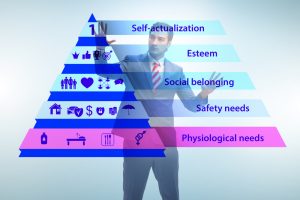Human Needs
Humanity in the fallen world has numerous needs to maintain existence. Among the most basic needs are food and water. Instinctively within human nature is a drive for to satisfy hunger and thirst, as well as drives to reproduce. These are natural evolutionary forces that push the human person to exist and perpetuate the species. In Abraham Maslow’s Hierarchy of Needs, Maslow lists basic needs of existence as the base of all needs. Following these needs are needs of safety and shelter. Beyond that is a more complex social need of belonging and love. Following this basic social need, is a mental need to perform and succeed in certain areas and talents that help manifest self esteem. Still even beyond those accomplishments, there needs to be a self actualization of self that recognizes one has met one’s fullest potential. Finally, after all these physical, social and mental accomplishments, one needs to find an existential or spiritual idea of meaning and tie that meaning into one’s life (Myers & Dewall, 2019, p. 351). Hence humanity has many needs to find completeness . Obviously in this search and motivation, the only fulfilling source of happiness is God. God is the ultimate source of happiness that can never be taken or stolen but promises infinite and eternal happiness that meets every human need.

Humanity still nonetheless experiences needs in the fallen world that fall short of the perfect End which is God. Throughout life, there are a multitude of illusionary goods that can distract the person from the true good. In psychological studies, the person is driven by motivation. Motivation is defined as “need or desire that energizes and directs behavior” (Myers & Dewall. 2019, p. 349). In addition to genetic and evolutionary drives, one is also driven to certain goods via an arousal of the psychological state that looks to decrease that desire through obtaining or fulfilling it. This is referred to as Drive-Reduction Theory (Myers and Dewall. 2019, p. 349).
In addition to drive, human nature is also guided by arousal. Some motivated behaviors increase arousal instead of decrease it (Myers and Dewall. 2019, p. 349). The Yerkes-Dodson Law points out that optimal performance exists when moderate arousal is present (Myers and Dewall. 2019, p. 350). Hence certain levels of arousal can be detrimental to overall human performance when not properly moderated.
Morality and Human Needs
These Psychological concepts help explain many of the inner workings of why a person is motivated to certain a good or need, but Moral Theology completes the story through spiritual explanation of the inner moving of the intellect and will. In Thomistic Philosophy, the soul is comprised of the intellect and will. The intellect processes information from the senses and is guided by the conscience in judgement. The will is the motivational force behind human decisions. Like in Psychology, the will seeks needs and ascertains the good of each need. Due to humanity’s fallen nature, sometimes this decision can be in contradiction to true moral good and the conscience.
St Thomas Aquinas refers to two types of human appetites within the will. The two he lists are the Concupiscible Appetite and the Irascible Appetite ( Aquinas. Summae Theologica). The Concupiscible Appetite’s formal object is a sensible good or evil, which is easily obtained while the Irascible Appetite’s formal object is a more abstract good which is arduous or difficult to obtain ( Aquinas. Summa Theologica). In regards to the Concupiscible Appetite, it is attracted to passions and emotions such as love or hate, desire or aversion, or joy and sorrow in regards to the sensible object (Aquinas. Summae Theologica). In regards to the Irascible Appetite, it deals with things that are difficult to attain and attached to emotions such as hope or despair, fear or daring, or anger (Aquinas. Summae Theologica). In essence, the Concupiscible Appetite deals with direct objects or sensible objects, while the Irascible Appetite deals with more abstract objects. In addition, the will interprets direct objects of the Concupiscible Appetite as they appear good or evil, while the Irascible Appetite is directed towards goods as they present themselves as something good or evil that might be difficult to achieve (Aquinas. Summae Theologica).

Hence emotion plays a large role in one’s appetites and how one is pushed towards or pulled away from an object. According to Myers and Dewall, emotion itself is the response of the whole organism from physiological arousal, expressive behaviors and conscious experience (2019, p. 369). Within the list of emotions, many scientists differ what are the core base emotions, but most concede that anger, fear, disgust, sadness and happiness are the basic human emotions (Myers and Dewall. 2019, p.369). Others also include interest, shame, guilt, as well as pride and love (Myers and Dewall. 2019, p. 369).
Ultimately, in Moral Theology, humanity’s broken nature due to Original Sin, prevents one from controlling one’s passions and emotions. The control our first father, Adam, experienced in the Garden has been corrupted and his descendants experience an ability to control emotion. This can be seen in the Amygdala. When emotional situations are perceived they can travel two ways. In the case of fear, the stimuli can travel the high road through Thalamus and Cortex which later proceeds through the Amygdala with a thought out emotional response, or it can take the faster low road with involves less thought since it is first processed through Amygdala (Myers and Dewall. 2019, p. 370). This leads to emotional outbursts and reactions.
One can see loss of control in many individuals. Whether utter fear, anger, or lust, one can lose control. The Holy Spirit gives humanity four cardinal virtues to help regulate the moral life. Among one of the most important related to emotional control is Temperance. Temperance helps curb emotional desires in moderation. Christians need to pray to the Holy Spirit and help cultivate this virtue in their daily moral life to better curb the Concupiscible Appetite’s desires and direct all deeds to the greater honor and glory of God. Furthermore, when Temperance is tied with the moral virtue of Prudence one can better discern good and evil within the Irascible Appetite’s abstract desires.
Conclusion
To lead a better moral life, one must understand that humanity is broken via Original Sin. While Psychology can give some explanations how these broken processes still operate, it is imperative that Christians take responsibility for their actions. While culpability can be lessened due to emotional outburst, it does not remove consequences or total culpability. One must constantly look to control their emotional actions and desires with direct and indirect objects. This involves prayer, fasting and denial. It involves following the example of Christ who taught temperance and moderation, as well as prayer to the Holy Spirit to supply the necessary graces to overcome one’s fallen nature on Earth.

Please also review AIHCP’s Christian Counseling Certification. The program is online and independent study and open to qualified professionals seeking a four year certification in Christian Counseling.
References
“Exploring Psychology”. Myers and Dewall. (2019). Worth Publishers: Macmillan Learning, New York. 11th Ed.
“The Summa Theologiæ of St. Thomas Aquinas”. Second and Revised Edition, 1920. Online: New Advent. Access here
Additional Resources
“Maslow’s Hierarchy of Needs”. Cherry, K. (2022). VeryWellMind. Access here
“Emotions”. Psychology Today Staff. Psychology Today. Access here
“The 6 Types of Basic Emotions and Their Effect on Human Behavior”. Cherry, K. (2022). VeryWellMind. Access here
